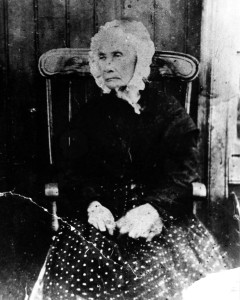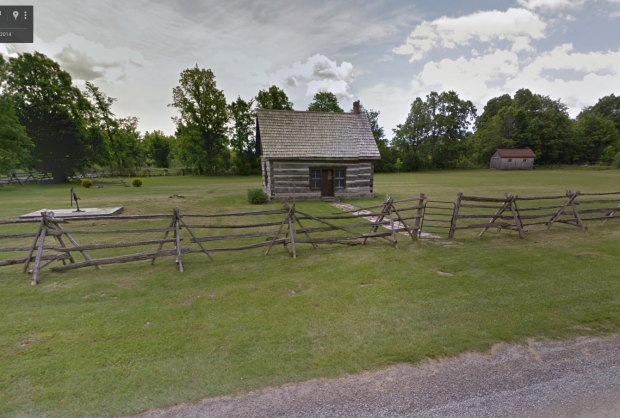For the past couple of years, knowing that I've told all of my strange-but-true stories here in Halloween posts already, I've been actively soliciting such stories from others; last year even seeking out my own eerie experience by going on a "Paranormal Night Paddle" with Indigenous guides and then sharing their stories here. Early this year, when our family was planning our annual trip down to Nova Scotia to visit Nan and Pop, and having Halloween in the back of my mind, I suggested that on the way back we could come through Massachusetts and visit Salem (as I've written before, I have a daughter who is interested in witchy things and has always wanted to go to Salem). And then it was March and COVID-19 became a bigger threat and the world shut down, and of course, we couldn't cross into the US and explore Salem this year. But that doesn't mean I don't have some witchy stories to share this Halloween.
It was during the early days of the shutdown that I read an article about "Randonautica", and for those not familiar with the experience, their website explains:
Randonauting is the act of using the Randonautica app to generate truly random locations sourced with quantum entropy. The user can then choose to venture to these locations to see what they find. They often discover that what they see lines up with their intention, which is what they were thinking about when they generated the point. But even if this doesn't happen, it's a way to mindfully explore the world around them.
As the article explained, people had been having some really weird experiences: users would concentrate, forming an intention, saying to themselves, "I want to see something red" or "something interesting" or perhaps most often, "something scary". When they would then generate a "truly random" set of coordinates through the app, they would often be led to exactly what they wanted to see (even, apparently, some users being led to murder scenes). Now, being the internet, who knows what's real and what's staged, but who wouldn't want to have an interesting experience? To "mindfully explore the world"?
So I downloaded the app and set my intention for, "I want to see something witchy". I was surprised to see that the coordinates I was given were for a house just a couple of streets away, so I put the leash on the dog and went for a walk. And as we walked past this very ordinary suburban home, I opened my mind to my intention, scanned the house and yard and saw...a broom on the porch? Is that something? Was I interpreting the results too broadly in order to get a result I wanted? If nothing else, it gave me something to think about and I kept walking with the dog, mulling it over.
When I later told my witchy daughter, Mallory, about my experience - thinking she would want to weigh in on whether or not I had had a meaningful experience - she was actually quite aghast with me. She knew about Randonautica, and from the witchy online forums she frequents, she had been warned that playing around with intention like this can be dangerous for the uninitiated. As she explained it to me, putting a request like this out into the universe requires the universe to spend energy replying; energy that it then needs to recover from the user. When someone sends out a request to see something dark or scary, the universe might provide, but it will draw out dark energies from that user. If someone wants to see something happy or positive, the universe will need to drain those positive energies from that user. Even someone like me who had a vague intention and received a vague response would have had to pay a price - and that's not something truly witchy people like to play around with.
But that doesn't mean that Mallory doesn't play. During the COVID lockdown, it was often just Mal and me at home here, and one day she came downstairs to see if I would like for her to read my tarot cards. I said sure and she set up the deck for a simple three card spread. She told me to think of a question that I'd like to have answered - as vague or as specific as I wanted - and to shuffle the deck and deal out three cards. The first card was the Two of Coins - which in Mallory's deck is represented by a male figure - and she explained that it means in the past, everything was dominated by a male energy that was interested in control and order. The next card was an upside-down Three of Coins - represented by a lone female figure, and Mallory was fascinated that these two cards came in sequence after the deck was shuffled - and she explained that since it was upside-down, that means that a female energy eventually came along and overturned the male dominance of the original card, lasting into the present. My last card was the Eight of Wands, and Mallory explained that it means that after a period of struggle, there will be rapid progression towards achieving goals and dreams in the future. I smiled at this reading and Mallory said, "You know, this isn't like a birthday wish that won't come true if you share it. You can tell me what your question was and I could help you to interpret this." I told Mal that my question was simply, "Will my girls be happy?", because that's the only question that's ever on my mind, and she got excited to point out her Dad as the male figure who dominated the family in the past (although I would question that; Dave has never been interested in dominance), me as the one who eventually overturned that status quo, and the future as looking pretty bright. As an amateur tarot reading, and especially as an essentially positive one, I'll take that. But is it something? And now, the story of an actual witch.
Instead of going to Nova Scotia this summer, we rented a cottage on a lake outside of Delta, Ontario - far enough from the crowds for our family bubble to relax together; with plenty of campfires and singalongs, swimming and kayaking and going for walks. Wanting to do something a little different one day, we decided to go for a hike at the nearby Charleston Lake Conservation Area, and on the way, check out the nearby homestead of Mother Barnes, the legendary "Witch of Plum Hollow". And here is her story:
Born the seventh daughter of a seventh daughter in County Cork at the turn of the nineteenth century, Elizabeth attributed her gift of second sight to her mother - rumoured to be a woman with Spanish Gypsy blood. Elizabeth eventually fell in love with an English military man - much to her Irish father's disapproval - so the couple eloped and ran away to Upper Canada, but not long after, the young husband died. Elizabeth then married an American shoemaker named David Barnes, but he ended up abandoning his wife and their nine children, leaving Elizabeth - now known as Mother Barnes - with only her talent for fortune telling as a means to support her large brood. But that's not quite as desperate as it sounds: Mother Barnes set up a room in her attic in which she read tea leaves, and word of her talents soon spread, attracting visitors from far and wide, and allowing her to charge twenty-five cents per reading (which was apparently quite a bit of money in the mid 1800s). Perhaps her most famous visitor was an ambitious young lawyer from Kingston who wanted to know what the future held for him, and Mother Barnes revealed that he would be the leader of a new country some day; a country whose capital would be set in the unlikely rough and tumble lumber center known as Bytown. That lawyer was John A. Macdonald, and in 1867, he would become the first Prime Minister of Canada (whose capital, Ottawa, is on the site formerly called Bytown). As her reputation for eerily accurate fortunes spread, Mother Barnes eventually became known as the Witch of Plum Hollow and she continued to read tea leaves in the attic of her log cabin - even helping the local police to solve mysteries - until her death in 1886.
Knowing this much about Mother Barnes, my own family sought out her old homestead (conveniently located along Mother Barnes Road outside of Plum Hollow), and although the No Trespassing signs kept us outside of the split-rail fence, it was intriguing to connect the solid log cabin in front of us to such a fascinating legend. (I was most amazed at how small the cabin was, and especially for a family with nine children.) As we walked around the perimeter, I noticed something glinting in the hedge, and getting closer, I was bemused to notice that someone had left a crystal on a chain there as, apparently, some kind of an offering to Mother Barnes. I beckoned Mallory over and pointed a finger towards the object (fetish? amulet?), and before I could say anything, Mallory blurted out a warning, "Don't touch that, Mom. We have no idea who left that there and for what purpose." Now, I don't know to what degree I believe in witchy spells and their ability to affect me, but I wasn't going to touch anything. And in a related note: As I said above, Mother Barnes was often consulted by the local police when they had a particularly perplexing mystery, and when a man named Morgan Doxtater went missing, the Witch of Plum Hollow was able to precisely direct the searchers to where his murdered body had been dumped - in Charleston Lake. Now, I didn't know that part of her story before we decided to combine a trip to Charleston Lake with a drive past the Mother Barnes homestead, but as we went on our hike and saw the lake itself, it did feel kind of connected. But is that something?
Setting intentions and invoking hidden powers - whether with tea leaves, tarot cards, or quantum number generators - it would seem that witchy business has always been with us; perhaps always will be. We humans might be programmed to look for meaning in the randomness around us, to try to find organic ways to influence our fates and fortunes, and perhaps, in this way, we're all really witches at heart. And that feels like something.
Strange stories from previous years:
Halloween I












